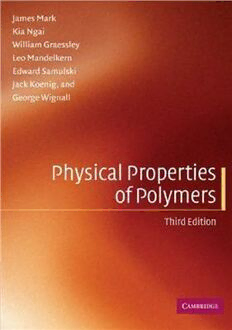
Physical Properties of Polymers PDF
Preview Physical Properties of Polymers
PHYSICAL PROPERTIES OF POLYMERS Thethirdeditionofthiswell-knowntextbookdiscussesthediversephysicalstates and associated properties of polymeric materials. The contents of the book have beenconvenientlydividedintotwogeneralparts,“Physicalstatesofpolymers”and “Somecharacterizationtechniques.” Thisthirdedition,writtenbysevenleadingfiguresinthepolymer-sciencecom- munity, has been thoroughly updated and expanded. As in the second edition, all ofthechapterscontaingeneralintroductorymaterialandcomprehensiveliterature citationsdesignedtogivenewcomerstothefieldanappreciationofthesubjectand howitfitsintothegeneralcontextofpolymerscience. The third edition of Physical Properties of Polymers provides enough core materialforaone-semestersurveycourseattheadvancedundergraduateorgraduate level. Professor James E. Mark is a consultative editor for the Cambridge polymer sciencelist. PHYSICAL PROPERTIES OF POLYMERS ThirdEdition JAMES MARK KIA NGAI WILLIAM GRAESSLEY LEO MANDELKERN EDWARD SAMULSKI JACK KOENIG GEORGE WIGNALL publishedbythepresssyndicateoftheuniversityofcambridge ThePittBuilding,TrumpingtonStreet,Cambridge,UnitedKingdom cambridge university press TheEdinburghBuilding,CambridgeCB22RU,UK 40West20thStreet,NewYork,NY10011–4211,USA 477WilliamstownRoad,PortMelbourne,VIC3207,Australia RuizdeAlarco´n13,28014Madrid,Spain DockHouse,TheWaterfront,CapeTown8001,SouthAfrica http://www.cambridge.org (cid:1)C JamesMark,KiaNgai,WilliamGraessley,LeoMandelkern,EdwardSamulski, JackKoenigandGeorgeWignall2003 Thisbookisincopyright.Subjecttostatutoryexception andtotheprovisionsofrelevantcollectivelicensingagreements, noreproductionofanypartmaytakeplacewithout thewrittenpermissionofCambridgeUniversityPress. PublicationDate2004forthe3rdedition (cid:1) 1steditionpublished1984AmericanChemicalSociety (cid:1) 2ndeditionpublished1993byAmericanChemicalSociety–DistributedbyOUP. PrintedintheUnitedKingdomattheUniversityPress,Cambridge TypefaceTimes11/14pt SystemLATEX2ε [tb] AcatalogrecordforthisbookisavailablefromtheBritishLibrary LibraryofCongressCataloginginPublicationdata Physicalpropertiesofpolymers/JamesMark...[etal.].–3rdedn. p. cm. Includesbibliographicalreferencesandindex ISBN052182317X–ISBN0521530180(pb.) 1.Polymers.2.Chemistry,Physicalandtheoretical.I.Mark,JamesE.,1934– TA455.P58P4742003 620.1(cid:2)92–dc21 2003048466 ISBN052182317Xhardback ISBN0521530180paperback TheauthorswishtodedicatethisvolumetothememoryofPaulJ.Flory,whose intuitivegraspofthefundamentalsofpolymersciencepredictedandintegrated muchoftheresearchdescribedintheirvariouscontributions.Paulwasan inspiringcolleaguetothoseofuswhowerefortunateenoughtoknowhim,and onewhoseinfluenceisstillverymuchinevidenceinthefield. Contents Notesoncontributors pagex Preface xv PartI Physicalstatesofpolymers 1 1 Therubberelasticstate,JamesE.Mark 3 1.1 Introduction 3 1.2 Theory 12 1.3 Someexperimentaldetails 19 1.4 Comparisonsbetweentheoryandexperiment 22 1.5 Someunusualnetworks 31 1.6 Networksatveryhighdeformations 35 1.7 Othertypesofdeformation 46 1.8 Gelcollapse 49 1.9 Energystorageandhysteresis 50 1.10 Bioelastomers 52 1.11 Fillednetworks 54 1.12 Newdevelopmentsinprocessing 60 1.13 Societalaspects 60 1.14 Currentproblemsandnewdirections 60 1.15 Numericalproblems 62 1.16 Solutionstonumericalproblems 62 Acknowledgments 63 References 63 Furtherreading 70 2 Theglasstransitionandtheglassystate,KiaL.Ngai 72 2.1 Introduction 72 2.2 Thephenomenologyoftheglasstransition 75 2.3 Modelsoftheglasstransition 94 vii viii Contents 2.4 DependencesofT onvariousparameters 101 g 2.5 StructuralrelaxationinpolymersaboveT 114 g 2.6 Theimpactonviscoelasticity 127 2.7 Conclusion 144 Acknowledgments 146 References 146 3 Viscoelasticityandflowinpolymericliquids, WilliamW.Graessley 153 3.1 Introduction 153 3.2 Conceptsanddefinitions 154 3.3 Linearviscoelasticity 159 3.4 Nonlinearviscoelasticity 170 3.5 Structure–propertyrelationships 184 3.6 Summary 205 References 206 4 Thecrystallinestate,LeoMandelkern 209 4.1 Introduction 209 4.2 Thethermodynamicsofcrystallization–melting ofhomopolymers 212 4.3 Meltingofcopolymers 217 4.4 Crystallizationkinetics 245 4.5 Structureandmorphology 267 4.6 Properties 295 4.7 Generalconclusions 307 References 308 Furtherreading 315 5 Themesomorphicstate,EdwardT.Samulski 316 5.1 Introduction 316 5.2 Generalconcepts 316 5.3 Monomerliquidcrystals 333 5.4 Macromolecularmesomorphism 353 5.5 Theoriesofmesomorphism 364 Acknowledgment 376 References 376 PartII Somecharacterizationtechniques 381 6 Theapplicationofmolecularspectroscopyto characterizationofpolymers,JackL.Koenig 383 6.1 Introduction 383 6.2 Vibrationaltechniques 384 Contents ix 6.3 Infraredspectroscopy 387 6.4 Ramanspectroscopy 397 6.5 Nuclear-magnetic-resonancespectroscopy 406 6.6 Massspectroscopy 419 References 422 7 Small-angle-neutron-scatteringcharacterization ofpolymers,GeorgeD.Wignall 424 7.1 Introduction 424 7.2 Elementsofneutron-scatteringtheory 437 7.3 Contrastanddeuteriumlabeling 444 7.4 SANSinstrumentation 451 7.5 Practicalconsiderations 457 7.6 Someapplicationsofscatteringtechniquestopolymers 468 7.7 Futuredirections 502 Acknowledgments 504 References 504 Index 513
